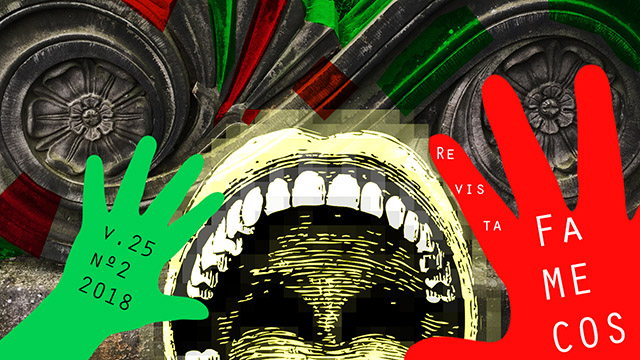Remix and sampling: DJs' identity and memory in the electronic music
DOI:
https://doi.org/10.15448/1980-3729.2018.2.28156Keywords:
Electronic music, Memory, IdentityAbstract
This research deals with the use of sampling and remix techniques as part of the creative processes in electronic music that, in certain cases, brings memories and musical identities. Based on Cultural Studies, this research investigates the hybridity in music productions made by four brazilian DJs: KL Jay (Racionais MC’s), Alfredo Bello (DJ Tudo), Luana Hansen (DJ and MC) and Rodrigo Gorky (Bonde do Rolê and Fatnotronic) – whose subjectivities are noted in sampling using and/or remixing. The ideia is understand how musical memory provides to the disc jockey certain elements that articulate hybridities in the musical language. Thus, the eluded aspect of these artists’ identities, that operates on hybrid substances of their songs, subverts standardization and hegemonic discourses in media culture.
Downloads
References
BOSI, Ecléa. O tempo vivo da memória: ensaios de psicologia social. São Paulo: Ateliê Editorial, 2003.
CANDAU, Joël. Memória e identidade. São Paulo: Contexto, 2014.
CONTER, Marcelo Bergamin; SILVEIRA, Fabrício Lopes da. Sampleamento de imagens sonoras em Fear of a Black Planet. Revista Resonancias, Santiago de Chile, v. 19, n. 35, p. 47-60, 2014. Disponível em: http://resonancias.uc.cl/images/PDFs_n_35/conter_lopes_sampleamento.pdf. Acesso em: 04 mai. 2017.
DE MARCHI, Leonardo. A angústia do formato: uma história dos formatos fonográficos. Revista E-Compós, Brasília, v. 2, 2005. Disponível em: http://www.compos.org.br/seer/index.php/e-compos/article/view/29/30. Acesso em: 20 abr. 2011.
DELEUZE, G; GUATTARI, F. Mil platôs: capitalismo e esquizofrenia, v. 1. São Paulo: Editora 34, 2000.
ECO, Umberto. La definición del arte. Barcelona: Martínez Roca, 1970.
FOUCAULT, Michel. Aesthetics, method, and epistemology. New York: The New Press, 1998.
GARCÍA CANCLINI, Néstor. Consumidores y ciudadanos conflictos multiculturales de la globalización. Miguel Hidalgo: Grijalbo, 1995.
GAVANAS, Anna; REITSAMER, Rosa. DJ technologies, social networks and gendered trajectories in european DJ cultures. In: ATTIAS, B. A.; GAVANAS, A.; RIETVELD, H. C. (edits.). DJ culture in the mix: power, technology, and social change in
electronic dance music. London: Bloomsbury Academic, 2013.
GOMES, Itania Maria Mota. Raymond Williams e a hipótese cultural da estrutura de sentimento. In: GOMES, I. M. M.; JANOTTI JR, J. (orgs.). Comunicação e estudos culturais. Salvador: Edufba, 2011.
GUNKEL, David J. Of remixology: ethics and aesthetics after remix. London: MIT Press, 2016.
HALL, Stuart. A identidade cultural na pós-modernidade. Rio de Janeiro: Lamparina, 2014.
______. Da diáspora: identidades e mediações culturais. Belo Horizonte: UFMG, 2003.
HALBWACHS, Maurice. Memória coletiva. São Paulo: Vértice, 1990.
LAPLANTINE, François; TRINDADE, Liana. O que é imaginário. São Paulo: Brasiliense, 1997.
LE GOFF, Jacques. História e memória. Campinas: Unicamp, 2003.
NAVAS, Eduardo. Remix theory: the aesthetics of sampling. New York: Springer-Verlag/Wien, 2012.
PERAZZO, Priscila Ferreira. Narrativas orais de histórias de vida. Revista Comunicação & Inovação. São Caetano do Sul, v. 16, n. 30, p. 121-131, 2015. Disponível em:
http://seer.uscs.edu.br/index.php/revista_comunicacao_inovacao/article/view/2754/1672 Acesso em: 14 ago. 2015.
PEREIRA, Simone Luci. Temos nosso próprio tempo: memória, temporalidade, consumo e imaginários juvenis sobre a década de 1980. In: ROCHA, R. M.; PERES-NETO, L. (orgs.). Memória, comunicação e consumo: vestígios e prospecções. Porto Alegre: Sulina, 2015.
REYNOLDS, Simon. Retromania: pop culture’s addiction to its own past. London: Faber and Faber, 2011.
SANTOS, Fátima Carneiro dos. Música das ruas: o exercício de uma escuta nômade. Revista Opus. São Paulo, v. 7, p. 62-71, set. 2000.
SARLO, Beatriz. Tiempo passado. Cultura de la memoria y giro subjetivo. Uma discusión. Buenos Aires: Siglo XXI Editores Argentinos, 2007.
TATIT, Luiz. O século da canção. São Paulo: Ateliê Editorial, 2004.
VARGAS, Herom; CARVALHO, Nilton F. de. DJ Tudo, samples e hibridismos: da linguagem do estúdio para a apresentação ao vivo. Líbero. São Paulo, v. 19, n. 38, p. 59-68, 2016. Disponível em: http://seer.casperlibero.edu.br/index.php/libero/article/
view/800/790. Acesso em: 5 jun. 2017.
VARGAS, Herom. Hibridismos musicais de Chico Science & Nação Zumbi. Cotia (SP): Ateliê Editorial, 2007.
VILA, Pablo. Identidades narrativas y música. Una primera propuesta para entender sus relaciones. TRANS Revista Transcultural de Música - Transcultural Music Review. Barcelona, n. 2, p. 1-26, 1996. Disponível em: http://www.sibetrans.com/
trans/articulo/288/identidades-narrativas-y-musica-una-primera-propuestapara-entender-sus-relaciones#top. Acesso em: 23 set. 2015.
WHITE, Phil; CRISELL, Luke; PRINCIPE, Rob. On the record. New York: St. Martin’s Press, 2009.
WILLIAMS, Raymond. Marxismo y literatura. Barcelona: Península, 1988.
Entrevistas:
Kleber Geraldo Simões (KL Jay), por Nilton Faria de Carvalho, 25 jul. 2015, São Paulo.
Luiz Alfredo Coutinho (DJ Tudo), por Nilton Faria de Carvalho, 19 jul. 2015, São Paulo.
Luana Hansen, por Nilton Faria de Carvalho, 16 jun. 2015, São Paulo.
Rodrigo Pereira Antunes (Rodrigo Gorky), por Nilton Faria de Carvalho, 30 jun. 2015,
São Paulo.
Downloads
Published
How to Cite
Issue
Section
License
Copyright
The submission of originals to Revista Famecos implies the transfer by the authors of the right for publication. Authors retain copyright and grant the journal right of first publication. If the authors wish to include the same data into another publication, they must cite Revista Famecos as the site of original publication.
Creative Commons License
Except where otherwise specified, material published in this journal is licensed under a Creative Commons Attribution 4.0 International license, which allows unrestricted use, distribution and reproduction in any medium, provided the original publication is correctly cited.






